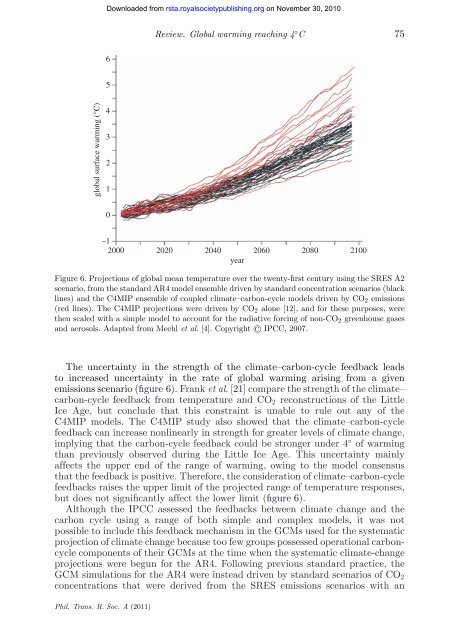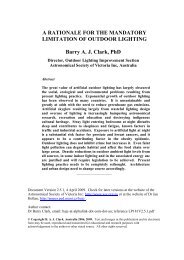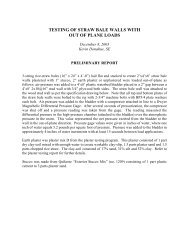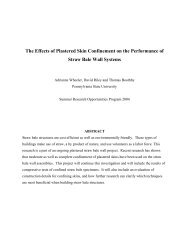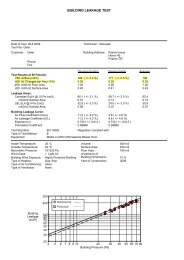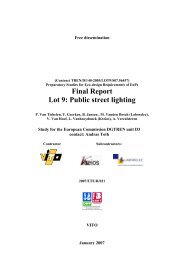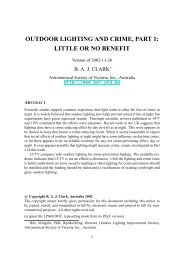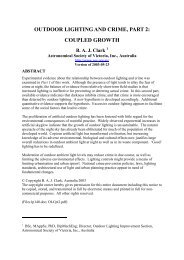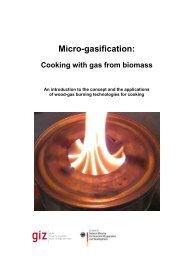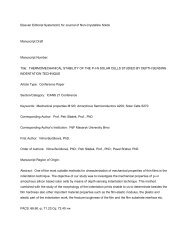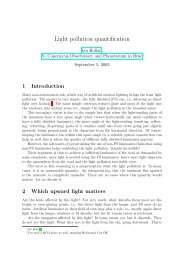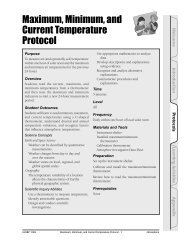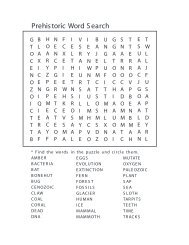Four degrees and beyond: the potential for a global ... - Amper
Four degrees and beyond: the potential for a global ... - Amper
Four degrees and beyond: the potential for a global ... - Amper
You also want an ePaper? Increase the reach of your titles
YUMPU automatically turns print PDFs into web optimized ePapers that Google loves.
<strong>global</strong> surface warming (°C)<br />
6<br />
5<br />
4<br />
3<br />
2<br />
1<br />
0<br />
–1<br />
2000<br />
Review. Global warming reaching 4 ◦ C 75<br />
2020 2040 2060 2080 2100<br />
year<br />
Figure 6. Projections of <strong>global</strong> mean temperature over <strong>the</strong> twenty-first century using <strong>the</strong> SRES A2<br />
scenario, from <strong>the</strong> st<strong>and</strong>ard AR4 model ensemble driven by st<strong>and</strong>ard concentration scenarios (black<br />
lines) <strong>and</strong> <strong>the</strong> C4MIP ensemble of coupled climate–carbon-cycle models driven by CO2 emissions<br />
(red lines). The C4MIP projections were driven by CO2 alone [12], <strong>and</strong> <strong>for</strong> <strong>the</strong>se purposes, were<br />
<strong>the</strong>n scaled with a simple model to account <strong>for</strong> <strong>the</strong> radiative <strong>for</strong>cing of non-CO2 greenhouse gases<br />
<strong>and</strong> aerosols. Adapted from Meehl et al. [4]. Copyright © IPCC, 2007.<br />
The uncertainty in <strong>the</strong> strength of <strong>the</strong> climate–carbon-cycle feedback leads<br />
to increased uncertainty in <strong>the</strong> rate of <strong>global</strong> warming arising from a given<br />
emissions scenario (figure 6). Frank et al.[21] compare <strong>the</strong> strength of <strong>the</strong> climate–<br />
carbon-cycle feedback from temperature <strong>and</strong> CO2 reconstructions of <strong>the</strong> Little<br />
Ice Age, but conclude that this constraint is unable to rule out any of <strong>the</strong><br />
C4MIP models. The C4MIP study also showed that <strong>the</strong> climate–carbon-cycle<br />
feedback can increase nonlinearly in strength <strong>for</strong> greater levels of climate change,<br />
implying that <strong>the</strong> carbon-cycle feedback could be stronger under 4 ◦ of warming<br />
than previously observed during <strong>the</strong> Little Ice Age. This uncertainty mainly<br />
affects <strong>the</strong> upper end of <strong>the</strong> range of warming, owing to <strong>the</strong> model consensus<br />
that <strong>the</strong> feedback is positive. There<strong>for</strong>e, <strong>the</strong> consideration of climate–carbon-cycle<br />
feedbacks raises <strong>the</strong> upper limit of <strong>the</strong> projected range of temperature responses,<br />
but does not significantly affect <strong>the</strong> lower limit (figure 6).<br />
Although <strong>the</strong> IPCC assessed <strong>the</strong> feedbacks between climate change <strong>and</strong> <strong>the</strong><br />
carbon cycle using a range of both simple <strong>and</strong> complex models, it was not<br />
possible to include this feedback mechanism in <strong>the</strong> GCMs used <strong>for</strong> <strong>the</strong> systematic<br />
projection of climate change because too few groups possessed operational carboncycle<br />
components of <strong>the</strong>ir GCMs at <strong>the</strong> time when <strong>the</strong> systematic climate-change<br />
projections were begun <strong>for</strong> <strong>the</strong> AR4. Following previous st<strong>and</strong>ard practice, <strong>the</strong><br />
GCM simulations <strong>for</strong> <strong>the</strong> AR4 were instead driven by st<strong>and</strong>ard scenarios of CO2<br />
concentrations that were derived from <strong>the</strong> SRES emissions scenarios with an<br />
Phil. Trans. R. Soc. A (2011)<br />
Downloaded from<br />
rsta.royalsocietypublishing.org on November 30, 2010


